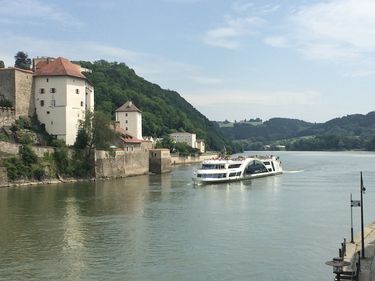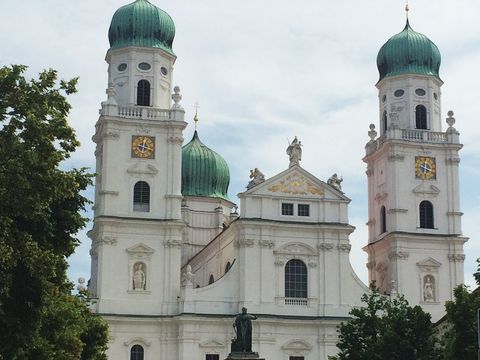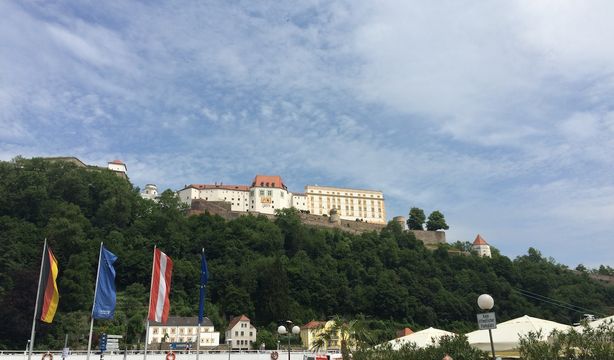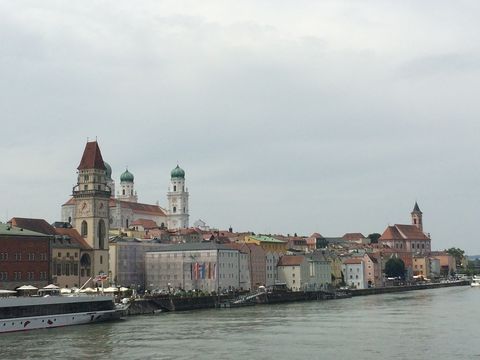#VeniceOfBavaria #FortressOberhaus #CityWithThreeRivers
Passau
BAVARIAN “GEMÜTLICHKEIT” WITH AN INTERNATIONAL FLAIR

Passau has often been praised as the “Venice of Bavaria” – no wonder with its narrow streets lined with small cafés, shops and numerous buildings designed by Italian architects. Taking a summer stroll through town feels a bit like you’re on holiday in Italy, although the eastern Bavarian city of Passau is situated closer to the border of Austria. Life here is easy-going, everything is close and the atmosphere is familiar.
Facts
52,415 Inhabitants ¹
12,624 Students ²
1 Higher education institution ²
WELCOME TO PASSAU
Passau boasts an illustrious history which still shapes its image to this day. Perched high above the historic part of town, one can see the “Veste Oberhaus”. A “Veste” is part of a fortress, and, looking at it from below, one can easily make out the inscription “1499”. That’s just one of the years construction was completed at the fortress. In fact, the foundation stone was laid in 1219 and partitions were continually added to the castle until 1800. It’s one of the largest castles in Europe in such a well-preserved condition. Inside, you will find the Oberhausmuseum which stages regular exhibitions on life at the castle and the history of the town.
Standing on the terrace called “Batterie Linde”, you can enjoy an especially nice view of the city’s most prominent landmarks – the Danube, Inn and Ilz Rivers. All three converge right below the castle, which is why Passau is also called the “three river city”. What’s particularly remarkable is the fact that each river has its own colour, making it possible to identify each one. The Danube River is blue, the Inn River is green and the Ilz River is black because it meanders through a moor before reaching Passau. Long ago, trading ships from the Orient carrying salt and spices would dock at the riverside promenade. Nowadays, you’ll find larger ships docked there, offering cruises up and down the Danube. The location at the three rivers has always been of great economic importance to Passau.
The historic centre of town is built on the narrow peninsula between the Inn and Danube Rivers. There you’ll find St. Stephan’s Cathedral, a Baroque church which houses five organs – the largest cathedral organs in the world! Other smaller churches are located throughout the city and the outskirts of town. The narrow streets that descend down the steep river banks are distinctive of Passau’s old part of town. Hidden within these winding streets are numerous restaurants and shops which sell all types of unique and extraordinary items. For example, the shops on Höllgasse are known for their artistic and handcrafted products unlike any you’ll find in Germany.
Tip
Go to the city fairs, like the “Dult”, as often as you can in the summer. Sitting in a tent with a “Breze” (soft pretzel) and a “Radler” (mixed beverage of beer and Sprite) is the ultimate Bavarian experience.
Don’t forget to visit the Scharfrichterhaus located next to the city hall. It’s a performance venue for comedians whose stand-up routines poke fun at (and sometimes scathe) society and politics. Many of the artists who take the stage are known far beyond Passau.
Interview
RAFAEL FROM BRAZIL
LIVING IN PASSAU
Because Passau is relatively small – with around 50,000 inhabitants – you’ll find many opportunities to get together with other students, for example, at city festivals and WG (flat-share) parties. Its university is also one of the smaller ones in Bavaria. All of the faculties are centrally located on campus, situated on the banks of the Inn River. Many students hang out between classes on the “Inn-Wiese”, a large campus lawn, where they relax or hold cook-outs in the summer.
You should definitely attend a “boat party”, where you can enjoy cool cocktails and great music while your ship slowly trundles up the Danube River. Tickets are available to the general public, and though the ticket price is a bit steep, it’s definitely worth it!
If you want to get to know other students, we recommend going to one of the many private parties held at flat-shares (WGs) and student residence halls. Since most of them are open to everyone, you can simply show up and join the party. If you want to go out, i.e. for drinks and dancing, you’ll find the best places downtown, in the historic city centre and the Innstadt. There are countless bars and cafés awaiting you there. Whether you are looking to spend a relaxing evening playing cards with friends at a pub, or you’d rather go posh and drink cocktails – these districts are the places to go.
Several festivals take place in Passau every year from spring to autumn, such as the “Dult” or the European Weeks Festival. You can buy fresh produce at the weekly market in front of the cathedral. In the winter, you can visit the festive Christmas market there which is popular with students, residents and visitors alike. When the weather is nice, there are plenty of recreational activities to do, such as touring the countryside by bike or taking a canoe trip.
What makes Passau so special is its colourful mix of private and public parties, small cafés in the historic district and international festivals. A small city at the Bavarian border where students can gain a good education and enjoy life.
#Leisure #Culture #SunnySouthernGermany


